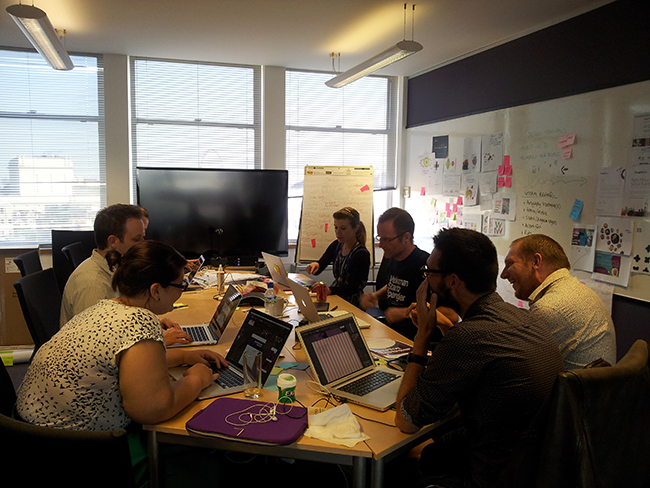
Leading Questions
People new to leadership quickly find themselves having to deal with all sorts of questions. As a new leader, how better to show that you are the right person for the job than by demonstrating your ability to solve any problem that comes your way? As you solve one problem, however, another is quickly there ready to take its place. Soon the number of problems grows beyond your capacity to handle them all in a timely fashion, and a queue of problems emerges ready for your sage advice that no one else seems able to offer. Many of these problems originate from your team who look to you for guidance on how to carry out their work in a way you find satisfactory. As these problems stack up the performance of your team starts to flag as they waste long periods of time waiting for you to give them direction on how to act and where to focus next.
It's not long before the pressure starts to mount. There is just too much for you to take charge of and questions about your team's ability to deliver are starting to echo around the halls of your organisation. To try and relieve some of this pressure you begin to delegate decisions to other people in your team. But somehow problems keep coming back to you as your delegates make wrong decisions or simply raise new questions in search of more concrete guidance. Everything else you try seems to just make matters worse, what was it that went wrong that resulted in you ending up at this point?

Put simply, your team has lost its ability of making effective decisions because you provided them with answers when questions were needed. You took away the opportunity for your team to learn and to become self sufficient by solving their problems for them. You placed yourself in the way of your team's ability to be effective because you didn't create the space for them to grow, the opportunity to learn through experience, and the support to safely fail.
Wait, don't beat yourself up too much; almost every new leader goes through this experience. At some point good leaders realise that they are in the position they are in because they know how to make good decisions and that their role is to help others to learn to do the same. We often joke about why anyone would take a great developer and turn them into someone that has little time to write the code they have built a reputation for. Yet people are promoted in this way all the time. The reason that high performers are placed into leadership roles is that we are looking for people that can take what they do well and to share their approach with others. Who wouldn't want to turn one great developer into ten?
There are plenty of stories about how great leaders seem to know the right questions to ask in any given situation. Questions that seem to unlock the secrets to great ideas and wealth. But how does one develop such a skill? The answer of course is by asking questions.

The first question you need to ask is to yourself. When presented with a problem similar to one you have dealt with in the past you are likely to come to a solution quickly. It's at this time you need to ask yourself, how did I come to this answer? For many of us there are a series of steps we take to arrive at a solution to a problem, steps that you are so used to traversing that you don't even pay attention to any more. It is important to understand that these steps exist only in your head and they are the reason you are good at what you do; the reason you have been put in the leadership role you are in. Your job is to help others learn how to go through these steps themselves and how to come to a solution on their own. These steps are usually questions whose answers will lead you down the path of finding the appropriate final answer. It is these questions that you need to give voice to. When asked for a solution to a problem by a member of your team, ask them the questions that you would ask yourself and take them through the process that you would take.
Let's say that a team member asks how to implement a new feature for the product you both work on. Whilst you might have a preferred solution already you choose to ask your colleague a series of questions to make sure they understand the solution better. If the requirements of the new feature are well known to both of you then a good opening question is "what are our options?" Assuming that you are given more than one option, you now have the ability to explore the pros and cons of each. Knowing the design principles and implementation constraints in play for this product helps you ask further questions that will identify one option as being the most appropriate fit. Questions like "how does this impact x" and "what happens if we encounter y" helps shape the solution in your colleagues mind without giving them the direct answer. Eventually you’ll get there, while in some cases you might choose to provide some help in getting to the solution faster.

At this point it is not necessary to ask your colleague every question that exists in your mind, just the ones that take them to the right conclusion. There will be other opportunities to ask new questions with this person when new problems arise. No one can take all your knowledge and experience at once; it takes time, it takes repetition, and it takes the right circumstances to acquire knowledge in this way. Over time, the people around you will build knowledge and experience themselves by working with you in this way and you will find that you have people that are able to not only think for themselves but people who take greater ownership for what they do.
Other than building up others and possibly removing yourself as a bottleneck for your team, what are your benefits in teaching people to think more like you? Won't you just become redundant? Well yes, congratulations, you now have the ability to take on greater responsibilities because you have successfully performed the role that has been asked of you. But if that's not enough, there are some other interesting side effects that I have found by taking this approach of giving questions in response to questions. First, you leave yourself open to better answers than the one you had thought of. Second, by developing your ability to ask questions, you learn what types of questions have the biggest impact. In essence you become one of those leaders from the management books we all read, you become someone that can unlock the potential of your people just by asking the right question at the right time.
At the end of the day it is time to admit that knowing the answer to everything is impossible and pursuing that path is just going to hold you and your team back. However, knowing how to ask the right questions gives you access to more answers than you ever thought possible, allowing you to be an even better leader.
Disclaimer: The statements and opinions expressed in this article are those of the author(s) and do not necessarily reflect the positions of Thoughtworks.














